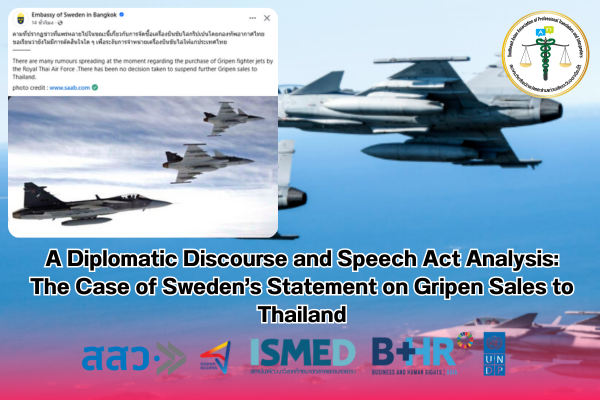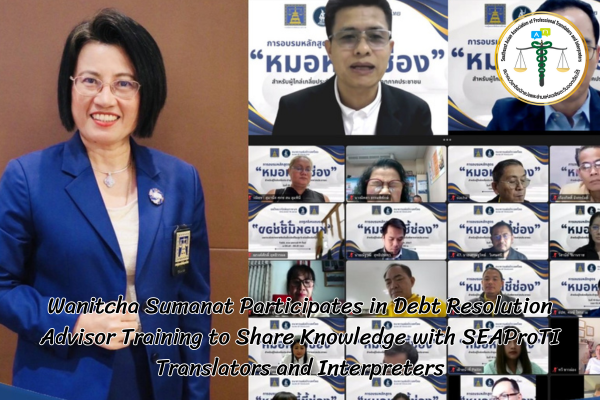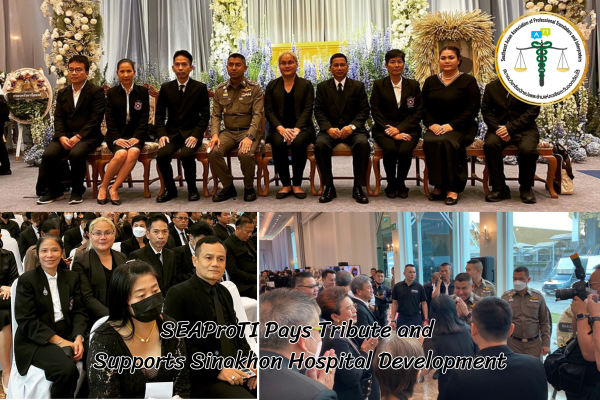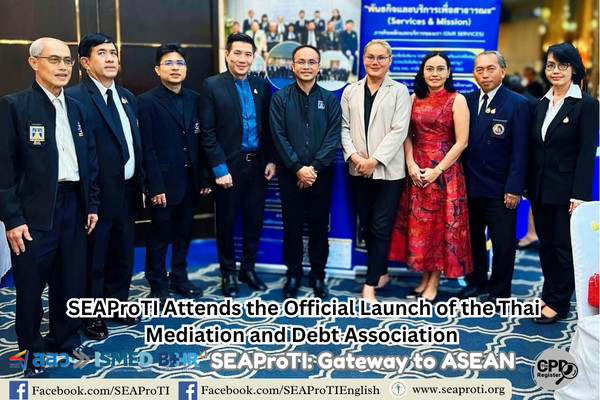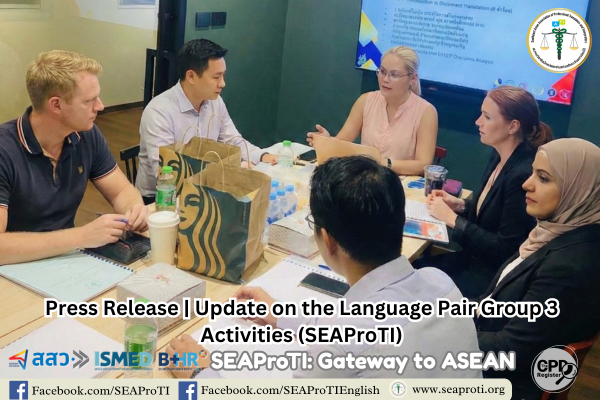A Diplomatic Discourse and Speech Act Analysis:
The Case of Sweden’s Statement on Gripen Sales to Thailand
by Wanitcha Sumanat, the president of the Southeast Asian Association of Professional Translators and Interpreters (SEAProTI)
2 August 2025, Bangkok – This article analyzes a diplomatic statement regarding Sweden’s military relations with Thailand, specifically the phrase “There has been no decision taken to suspend further Gripen sales to Thailand.” Using frameworks from speech act theory, Brown and Levinson’s politeness theory, connotation vs. denotation analysis, and regional comparative discourse, the study argues that diplomatic language often creates an interpretive space that preserves bilateral relationships. Strategic ambiguity and face-saving mechanisms are central to this kind of discourse, particularly in high-stakes international relations.
Introduction
Diplomatic language serves not only to convey factual information but also to maintain political relationships between states. Carefully chosen words can defuse tensions and sustain cooperation even in sensitive contexts. The statement issued concerning the sale of Gripen fighter jets to Thailand—“There has been no decision taken to suspend further Gripen sales to Thailand.”—is a prime example of how discourse functions as a diplomatic tool. This article examines the linguistic and pragmatic features of this utterance using multiple theoretical lenses.
Speech Act Analysis
According to Searle’s (1975) taxonomy, the statement is an assertive speech act, intended to state facts. However, in context, it performs an indirect speech act, signaling a degree of uncertainty or future possibility—namely, that a decision might yet be made. This ambiguity allows the speaker to maintain strategic flexibility, a hallmark of diplomatic language (Blum-Kulka, 1989).
Politeness Strategies and Face-Saving (Brown & Levinson)
Drawing on Brown and Levinson’s (1987) politeness theory, the statement employs negative politeness strategies to avoid imposing on any party and to preserve diplomatic “face.” The use of passive construction—“no decision taken”—also suppresses agency, avoiding blame or attribution to any specific actor (e.g., SAAB or the Swedish government). This contributes to face-saving for both the speaker and the Thai government, minimizing friction (Watts, 2003).
Connotation and Denotation
| Expression Used | Denotation | Connotation |
|---|---|---|
| “No decision taken” | No decision has been made | A decision might still be made later |
| “Suspend” | Temporarily halt | Not permanent; reversible |
| “Further sales” | Future transactions | Current agreements are unaffected |
The word choices are deliberately mild. The use of “suspend” instead of “terminate”, for instance, reduces perceived severity and maintains a diplomatic tone. Lexical ambiguity is a key feature of political discourse (Stubbs, 2001).
Discourse Framing and Control
Rather than addressing the full scope of circulating rumors, the speaker frames the issue narrowly, focusing only on the absence of a decision. This is a form of discourse control (van Dijk, 1998), whereby the speaker determines the boundaries of acceptable interpretation. It also redirects attention away from any potential policy rupture or bilateral conflict.
Regional Comparison: Southeast Asia Cases
Similar rhetorical strategies are evident in Southeast Asia:
- Philippines–US relations (Duterte era): “We remain committed to the partnership.” – Maintains a positive frame despite internal tensions.
- China–Singapore relations (South China Sea tensions): “We hope all parties act prudently.” – Uses generalization to avoid direct attribution of blame.
- Thailand–Sweden (Gripen case): “No decision taken…” – Defers commitment, allowing space for future engagement.
All these examples reflect strategic ambiguity in diplomatic statements, reinforcing the argument that hedging is central to regional diplomacy (Joseph, 2006).
Conclusion
The phrase “There has been no decision taken to suspend further Gripen sales to Thailand” exemplifies how diplomatic discourse operates on multiple levels—maintaining face, controlling interpretation, and deferring irreversible commitments. Such language is crafted to preserve bilateral flexibility while avoiding reputational harm. In sum, it demonstrates how diplomacy is not only a matter of policy but also of discursive construction, where meaning is negotiated through strategic ambiguity.
References
- Blum-Kulka, S. (1989). Cross-cultural pragmatics: Requests and apologies. Norwood, NJ: Ablex.
- Brown, P., & Levinson, S. C. (1987). Politeness: Some universals in language usage (2nd ed.). Cambridge University Press.
- Joseph, J. E. (2006). Language and politics. Edinburgh University Press.
- Searle, J. R. (1975). Indirect speech acts. In P. Cole & J. Morgan (Eds.), Syntax and semantics, Vol. 3: Speech acts (pp. 59–82). Academic Press.
- Stubbs, M. (2001). Words and phrases: Corpus studies of lexical semantics. Blackwell.
- van Dijk, T. A. (1998). Ideology: A multidisciplinary approach. Sage Publications.
- Watts, R. J. (2003). Politeness. Cambridge University Press.
SEAProTI’s certified translators, translation certification providers, and certified interpreters:
The Southeast Asian Association of Professional Translators and Interpreters (SEAProTI) has officially announced the criteria and qualifications for individuals to register as “Certified Translators,” “Translation Certification Providers,” and “Certified Interpreters” under the association’s regulations. These guidelines are detailed in Sections 9 and 10 of the Royal Thai Government Gazette, issued by the Secretariat of the Cabinet under the Office of the Prime Minister of the Kingdom of Thailand, dated July 25, 2024, Volume 141, Part 66 Ng, Page 100. The Royal Thai Government Gazette
การวิเคราะห์เชิงวัจนปฏิกิริยาและวาทกรรมทางการทูต: กรณีถ้อยแถลงเกี่ยวกับการขายเครื่องบิน Gripen ให้แก่ประเทศไทย
โดย วณิชชา สุมานัส นายกสมาคมวิชาชีพนักแปลและล่ามแห่งเอเชียตะวันออกเฉียงใต้
2 สิงหาคม 2568, กรุงเทพมหานคร – บทความนี้วิเคราะห์ถ้อยแถลงทางการทูตที่ใช้ถ้อยคำว่า “There has been no decision taken to suspend further Gripen sales to Thailand.” ในประเด็นความสัมพันธ์ทางการทหารระหว่างสวีเดนและไทย โดยใช้แนวคิดจากวัจนปฏิกิริยา (speech act theory), การรักษาหน้าตามแนวคิดของ Brown และ Levinson (politeness theory), การวิเคราะห์คำ (connotation/denotation) ตลอดจนการเปรียบเทียบกับกรณีในภูมิภาคเอเชียตะวันออกเฉียงใต้ พบว่าภาษาทางการทูตมีลักษณะเฉพาะในการสร้าง “พื้นที่ตีความ” และรักษาสัมพันธภาพระหว่างรัฐผ่านกลยุทธ์ของการคลุมเครือเชิงสร้างสรรค์
บทนำ
ภาษาทางการทูตมิได้ทำหน้าที่เพียงสื่อสารข้อเท็จจริง แต่ยังทำหน้าที่เป็นเครื่องมือในการรักษาความสัมพันธ์ทางการเมืองระหว่างรัฐ การเลือกใช้ถ้อยคำที่ไม่ขัดแย้ง แม้ในสถานการณ์ที่อ่อนไหว จึงสะท้อนกลยุทธ์ทางอำนาจที่แฝงอยู่ในวาทกรรม การแถลงของตัวแทนที่เกี่ยวข้องกับการขายเครื่องบินขับไล่ Gripen ให้แก่ประเทศไทย ซึ่งระบุว่า “There has been no decision taken to suspend further Gripen sales to Thailand.” เป็นตัวอย่างสำคัญที่ควรได้รับการวิเคราะห์อย่างเป็นระบบ
การวิเคราะห์เชิงวัจนปฏิกิริยา (Speech Act Analysis)
ตามทฤษฎีวัจนปฏิกิริยาของ Searle (1975) ข้อความดังกล่าวอยู่ในประเภท Assertive ซึ่งมีลักษณะเป็นการยืนยันข้อเท็จจริง อย่างไรก็ตาม เมื่อพิจารณาเชิงบริบท พบว่าเป็น indirect speech act ที่มีความคลุมเครือโดยตั้งใจ กล่าวคือ แม้จะยืนยันว่า “ยังไม่มีการตัดสินใจ” แต่ก็แฝงนัยว่า “มีความเป็นไปได้ที่จะมีการตัดสินใจในอนาคต” (Blum-Kulka, 1989) ซึ่งเป็นกลยุทธ์ในการคงความยืดหยุ่นของท่าทีในทางการทูต
กลยุทธ์การรักษาหน้าทางการทูต (Politeness Theory)
ทฤษฎี Politeness ของ Brown & Levinson (1987) ชี้ว่า ผู้พูดมักเลือกใช้ถ้อยคำที่ช่วยรักษา “หน้า” (face) ของตนและของคู่สนทนา โดยเฉพาะในระดับการเมืองระหว่างประเทศ การใช้คำว่า “no decision taken” เป็นตัวอย่างของ Negative politeness ที่หลีกเลี่ยงการแสดงท่าทีตรงหรือคำที่อาจทำให้ฝ่ายใดฝ่ายหนึ่งเสียหน้า นอกจากนี้ยังลดทอน agency ของผู้กระทำ โดยไม่ระบุว่า “ใคร” เป็นผู้ตัดสินใจหรือชะลอการขาย เพื่อป้องกันความขัดแย้งเชิงบุคคล (Watts, 2003)
การวิเคราะห์ความหมายโดยนัย (Connotation vs. Denotation)
| ถ้อยคำที่ใช้ | ความหมายตรง (Denotation) | ความหมายโดยนัย (Connotation) |
|---|---|---|
| “No decision taken” | ยังไม่มีการตัดสินใจ | อาจตัดสินใจได้ภายหลัง |
| “Suspend” | ระงับชั่วคราว | ยังไม่ถึงขั้นยุติ / มีโอกาสฟื้นฟู |
| “Further sales” | การขายเพิ่มเติม | ไม่มีผลต่อข้อตกลงเดิม |
คำศัพท์ที่เลือกมีน้ำหนักเบาและไม่ชี้ชัด เช่น การใช้ “suspend” แทน “terminate” ช่วยลดแรงกระแทกทางจิตวิทยาและการตีความเชิงลบ (Stubbs, 2001)
การควบคุมวาทกรรม (Discourse Framing)
ผู้พูดเลือกที่จะกล่าวเฉพาะบางแง่มุมของข่าวลือ โดยไม่ขยายความ หรือยืนยันรายละเอียดใด ๆ ของข่าว นี่เป็นตัวอย่างของการ “ควบคุมวาทกรรม” (discourse control) ซึ่งทำหน้าที่ framing ทิศทางของการรับรู้ของสาธารณะและสื่อ (van Dijk, 1998) โดยผู้พูดเป็นผู้กำหนดว่าข้อความใดจะถูกยกมาพูดถึง และข้อความใดจะถูกละเว้น
การเปรียบเทียบกับกรณีในภูมิภาค
ถ้อยคำในลักษณะเดียวกันปรากฏในหลายกรณีในเอเชียตะวันออกเฉียงใต้ เช่น
- กรณีฟิลิปปินส์–สหรัฐฯ: “We remain committed to the partnership.” → รักษาน้ำเสียงบวกแม้มีความตึงเครียด
- จีน–สิงคโปร์: “We hope all parties act prudently.” → ใช้ third-party generalization เพื่อหลีกเลี่ยงการกล่าวโทษ
- ไทย–สวีเดน (กรณี Gripen): “No decision taken…” → ชะลอการแสดงท่าที ช่วยคงระดับการเจรจาไว้
ในทุกกรณี การเลือกใช้ภาษาทางการทูตเป็นเครื่องมือในการรักษาสัมพันธภาพเชิงอำนาจ (Joseph, 2006)
บทสรุป
ตัวอย่างถ้อยแถลงที่กล่าวว่า “There has been no decision taken to suspend further Gripen sales to Thailand.” คือการใช้ภาษาทางการทูตที่สะท้อนความเข้าใจลึกซึ้งในกลไกการสื่อสารระหว่างรัฐ โดยผสมผสานการรักษาหน้า การหลีกเลี่ยงคำแรง การใช้ความคลุมเครือ และการควบคุมการตีความเพื่อสร้าง “พื้นที่แห่งความยืดหยุ่น” (discursive space) สำหรับการเจรจาและความร่วมมือในอนาคต
บรรณานุกรม (References)
- Blum-Kulka, S. (1989). Cross-cultural pragmatics: Requests and apologies. Norwood, NJ: Ablex.
- Brown, P., & Levinson, S. C. (1987). Politeness: Some universals in language usage (2nd ed.). Cambridge University Press.
- Joseph, J. E. (2006). Language and politics. Edinburgh University Press.
- Searle, J. R. (1975). Indirect speech acts. In P. Cole & J. Morgan (Eds.), Syntax and semantics, Vol. 3: Speech acts (pp. 59–82). Academic Press.
- Stubbs, M. (2001). Words and phrases: Corpus studies of lexical semantics. Blackwell.
- van Dijk, T. A. (1998). Ideology: A multidisciplinary approach. Sage Publications.
- Watts, R. J. (2003). Politeness. Cambridge University Press.
เกี่ยวกับนักแปลรับรอง ผู้รับรองการแปล และล่ามรับรองของสมาคมวิชาชีพนักแปลและล่ามแห่งเอเชียตะวันออกเฉียงใต้
สมาคมวิชาชีพนักแปลและล่ามแห่งเอเชียตะวันออกเฉียงใต้ (SEAProTI) ได้ประกาศหลักเกณฑ์และคุณสมบัติผู้ที่ขึ้นทะเบียนเป็น “นักแปลรับรอง (Certified Translators) และผู้รับรองการแปล (Translation Certification Providers) และล่ามรับรอง (Certified Interpreters)” ของสมาคม หมวดที่ 9 และหมวดที่ 10 ในราชกิจจานุเบกษา ของสำนักเลขาธิการคณะรัฐมนตรี ในสำนักนายกรัฐมนตรี แห่งราชอาณาจักรไทย ลงวันที่ 25 ก.ค. 2567 เล่มที่ 141 ตอนที่ 66 ง หน้า 100 อ่านฉบับเต็มได้ที่: นักแปลรับรอง ผู้รับรองการแปล และล่ามรับรอง


